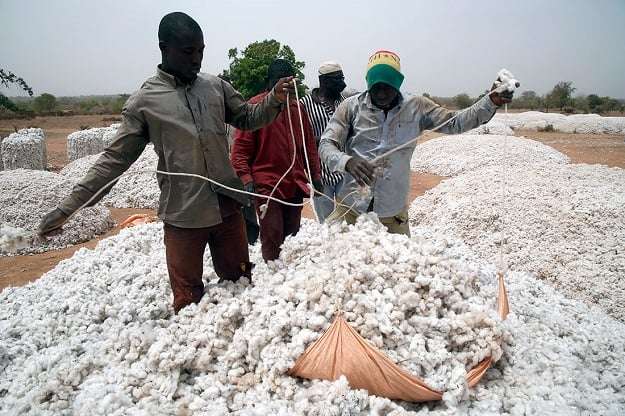
|
Getting your Trinity Audio player ready...
|
Introduction The cotton industry in Pakistan, which has historically been a backbone of the country’s textile sector, is facing critical challenges. In light of falling domestic cotton production and rising unsold stocks, concerns have emerged about the sustainability of Pakistan’s Generalized Scheme of Preferences Plus (GSP+) status. With this status set for a review by the European Union (EU) in June 2025, stakeholders fear that failure to meet international compliance standards may result in the loss of preferential trade benefits.
H1: The Impending Review of Pakistan’s GSP+ Status
The EU’s decision to re-assess Pakistan’s GSP+ status comes amidst growing concerns over the country’s cotton production and related textile industry issues. Initially, the EU had granted Pakistan the GSP+ status until 2027, which allows the country to export various products to EU countries with preferential tariffs. However, this trade privilege is contingent on compliance with 27 international conventions, which cover human rights, environmental laws, and labor rights.
In early 2025, EU officials visited Pakistan to assess whether the country meets these obligations. Their assessment will be crucial in determining whether Pakistan can maintain its GSP+ status. The possibility of suspension due to non-compliance has raised alarm bells across various sectors, particularly the textile and cotton industries.
H2: The Cotton Crisis: Production and Stockpiles
One of the main factors influencing the EU’s review of Pakistan’s GSP+ status is the state of the country’s cotton production. According to the Pakistan Cotton Ginners Association (PCGA), cotton production has dropped significantly, with a current figure of 5.51 million bales recorded by the end of January 2025. This is 34% lower than the same period in the previous year. Additionally, the production figures for this year are about 50% below the target, signaling a sharp decline in the country’s cotton yield.
H3: Unsold Cotton and Yarn: The Growing Concern
Despite the lower production, unsold stocks of cotton and cotton yarn have surged by 31%, accumulating to 486,000 bales in ginning factories. This increase in unsold stock highlights a mismatch between production and demand in the domestic market. Furthermore, the situation is exacerbated by textile mills drastically reducing their cotton purchases.
The root cause of this decline in cotton purchases is Pakistan’s policy on cotton imports. Imported cotton and yarn are exempt from the 18% sales tax levied on locally produced cotton. As a result, textile mills find it more economical to source cotton and yarn from abroad rather than supporting domestic producers. This preferential treatment for imported cotton has led to a situation where locally produced cotton remains unsold in large quantities, creating tension within the domestic supply chain.
H2: The Impact on the Textile Sector and the Broader Economy
Pakistan’s textile industry, which is heavily reliant on cotton, has been adversely affected by these disruptions. Many spinning mills, which are the backbone of the textile manufacturing sector, have slowed down or become inactive due to the reduced availability of domestic cotton. As cotton purchases from local suppliers decline, many ginning factories face bankruptcy due to the inability to sell their stocks.
On top of this, the country has already imported 1.5 million bales of cotton, and additional agreements for 30-35 million bales have been signed. By the end of 2025, the total imports are expected to reach 50-55 million bales. This large dependency on imported cotton is straining Pakistan’s foreign exchange reserves, making it a matter of urgency for the government to act.
H3: Government Recommendations: A Push for Policy Reform
Ehsanul Haq, the Chairman of the Cotton Ginners Forum, has called on the government to address these issues by imposing sales tax on imported cotton and yarn. According to Haq, this would help stabilize local cotton prices, encourage domestic cultivation, and reduce the strain on foreign reserves. He has urged Prime Minister Shehbaz Sharif and officials from the Special Investment Facilitation Council (SIFC) to reconsider their stance on imported cotton and yarn.
By levying a sales tax on these imports, the government could help boost local cotton prices, making domestic production more competitive. This, in turn, would encourage more cotton cultivation for the upcoming season, ensuring a sustainable cotton supply and a thriving textile industry.
H2: The Potential Loss of GSP+ Benefits: A Threat to Pakistan’s Economy
The potential suspension of Pakistan’s GSP+ status due to non-compliance with the EU’s conditions is another pressing concern. If the EU decides to revoke Pakistan’s preferential trade status, the country could lose access to lower tariffs for a range of exports. This would have severe economic consequences, particularly for the textile sector, which relies heavily on the EU market for its exports.
H3: The Role of GSP+ in Pakistan’s Trade
GSP+ allows Pakistani exporters to access the European market with preferential tariffs on 66% of all tariff lines, particularly for textiles, garments, and other products. Without GSP+, Pakistan would face higher tariffs, making its exports less competitive compared to other countries that still benefit from such trade privileges. This would increase the cost of Pakistani products in European markets and could result in a decline in export volumes.
H2: Addressing the Cotton Crisis: Solutions and Recommendations
To address the growing concerns over cotton production and GSP+ status, several steps need to be taken to revive the cotton sector in Pakistan.
H3: Improving Cotton Cultivation Practices
Pakistan’s cotton farmers are currently facing significant challenges due to a lack of modern farming techniques, inefficient irrigation systems, and fluctuating weather patterns. To address these issues, the government should invest in training programs for farmers, provide access to better seeds and fertilizers, and modernize irrigation infrastructure. This would help increase cotton yields, ensuring that the country can meet both domestic demand and export requirements.
H3: Reforming Tax Policies
One of the most urgent reforms needed in the cotton sector is the imposition of a sales tax on imported cotton and yarn. This would incentivize textile mills to purchase cotton from local ginners, thereby reducing the unsold stocks in factories. Additionally, it would help stabilize local cotton prices and promote domestic cultivation.
H3: Strengthening Compliance with International Standards
To maintain its GSP+ status, Pakistan must strengthen its compliance with international labor and environmental standards. This includes improving workers’ rights, ensuring environmental sustainability in textile production, and adhering to the conventions set by the EU. Failure to meet these standards could lead to the suspension of GSP+ benefits, which would have devastating consequences for the economy.
FAQs:
1. What is the GSP+ status and why is it important for Pakistan? GSP+ is a preferential trade arrangement that allows Pakistan to export goods to the EU with reduced or zero tariffs. It is crucial for Pakistan’s textile sector, as it gives the country access to European markets at competitive rates.
2. How much has Pakistan’s cotton production decreased in 2025? Cotton production in Pakistan has decreased by 34% compared to the previous year, and it is approximately 50% below the target set for 2025.
3. What impact has the reduction in domestic cotton purchases had on the textile industry? The reduction in domestic cotton purchases has led to increased unsold stocks in ginning factories, lower activity in spinning mills, and even bankruptcy for some ginners. This has negatively impacted the textile industry.
4. Why are imported cotton and yarn preferred over local cotton? Imported cotton and yarn are exempt from the 18% sales tax imposed on locally produced cotton and yarn, making them more cost-effective for textile mills.
5. What steps can the government take to address the cotton crisis? The government can impose sales tax on imported cotton, invest in modernizing cotton farming practices, and ensure compliance with international labor and environmental standards to maintain GSP+ status.
Conclusion: The cotton crisis in Pakistan has far-reaching implications for the textile industry, the economy, and the country’s trade relations with the EU. Immediate reforms in tax policies, cotton cultivation practices, and international compliance are crucial for stabilizing the sector and preserving Pakistan’s preferential trade benefits.






